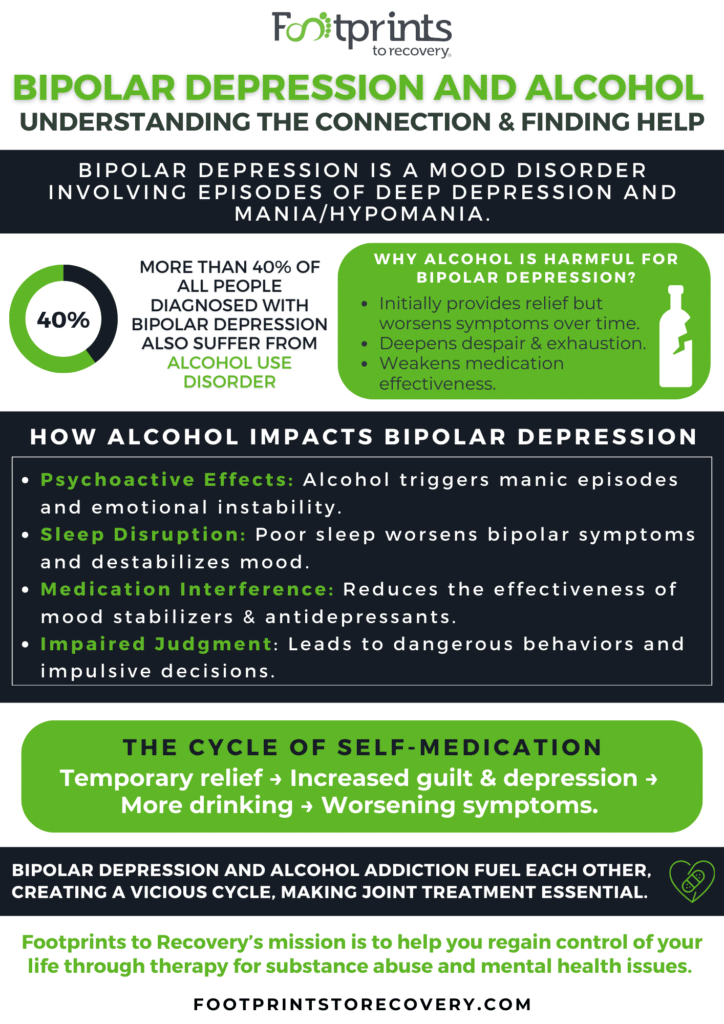Bipolar depression is a facet of bipolar disorder, a complex mood disorder characterized by episodes of deep depression and, at times, mania or hypomania. Alcohol, a depressant, can have immediate and lasting damaging effects on individuals with bipolar disorder, often exacerbating symptoms and complicating treatment. Yet far too many with the disorder have drinking problems. This article will explore the relationship between bipolar depression and alcohol.
The Link Between Bipolar Depression and Alcohol
Alcohol and bipolar depression are inextricably intertwined. Of all substance use disorders, alcoholism has the highest prevalence of co-occurrence with bipolar disorder. More than 40% of all people diagnosed with bipolar depression also suffer from alcohol use disorder.
While alcohol may initially appear to help sadness, it can exacerbate symptoms over time. The use of alcohol as a coping method for bipolar depression can exacerbate symptoms over time. Alcohol is a depressant that can worsen emotions of despair, helplessness, and exhaustion.
One of the main reasons bipolar depression and alcohol don’t mix is it undermines medications meant to treat the disorder. Many medications used to treat bipolar disorder, including mood stabilizers, antidepressants, and antipsychotics, interact negatively with alcohol. Drinking can reduce their effectiveness, leading to worsening symptoms or dangerous side effects.
How Alcohol Impacts Bipolar Depression
While in the short term, alcohol can raise mood by inducing a feeling of euphoria, the costs are not worth it, especially for those with bipolar depression. It exacerbates the illness by causing rapid mood shifts, worsening depression, or triggering mania. A 2006 study on bipolar depression and alcohol discovered a clear relationship between alcohol use and the frequency of depression or manic episodes.
There are a couple of ways this can happen:
- Psychoactive: Alcohol consumption directly affects mood, inducing euphoria in the short term. This can push those with bipolar disorder into mania.
- Sleep Disruption: Alcohol also disrupts sleep – Sleep disturbances are a core feature of bipolar disorder. Alcohol can disrupt sleep cycles, leading to poor-quality rest, which may contribute to further mood destabilization.
- Reduced Medication Effectiveness: Many medications used to treat bipolar disorder, including mood stabilizers, antidepressants, and antipsychotics, interact negatively with alcohol. Drinking can reduce their effectiveness, leading to worsening symptoms or dangerous side effects.
Overall, alcohol consumption can quickly destabilize mood, impair decision-making, and worsen depressive symptoms in individuals with bipolar disorder. Even occasional drinking can interfere with treatment and increase the risk of dangerous behaviors, making bipolar depression and alcohol two things that don’t mix.
Longer-Term Risks of Mixing Bipolar Depression and Alcohol
Chronic alcohol use over the long term can be even worse for those with bipolar depression. Long-term alcohol consumption can lead to brain shrinkage, cognitive impairment, and memory problems. For someone with bipolar disorder, these effects may further exacerbate executive dysfunction and emotional regulation difficulties.
Alcohol use can also negatively affect relationships, leading to increased social isolation, which is already a risk factor for worsening bipolar depression. This can contribute to a cycle of loneliness, guilt, and emotional distress.
And finally, there’s the risk of addiction. People with bipolar disorder are at a higher risk of developing substance abuse problems. Studies suggest that up to 60% of individuals with bipolar disorder experience some form of substance abuse in their lifetime. Self-medicating with alcohol can create a cycle of dependency that worsens mood disorders.

"*" indicates required fields
Fill out the form below and one of our admissions team members will reach out to you:
"*" indicates required fields
The Cycle of Self-Medication
One of the most common issues seen in those who suffer mood disorders is what’s known as self-medication. This essentially means they abuse substances like drugs or alcohol in an attempt to cope with the symptoms of their disorder. According to one study on bipolar depression and alcohol, 41% of those with bipolar I disorder and 35% of those with bipolar II reported self-medicating with drugs, alcohol, or both.
While it may provide temporary relief, self-medication often leads to a destructive cycle that worsens both mental and physical health over time. It temporarily alleviates some symptoms of bipolar depression while exacerbating them over the long term. It also induces feelings of guilt and shame, which then spurs people with bipolar depression to drink further in order to escape those feelings.
Self-medication is not the answer. Instead, seek professional help. Treatment plans from licensed professionals that integrate mental health care and substance use recovery offer the best chance for long-term stability and well-being.
Treating Bipolar Disorder and Alcohol Abuse
Because bipolar depression and alcohol addiction often co-occur, they can feed into each other, each reinforcing the other, creating a vicious cycle. Because of this, it’s important they be treated together.
This is known as dual diagnosis treatment. With dual diagnosis treatment, addiction specialists develop a personalized treatment plan designed to treat both disorders. In the case of bipolar depression and alcohol use disorder, this may involve things like cognitive-behavioral therapy, along with psychiatric medications like lithium or other antidepressants. And, of course, the full spectrum of care required for alcohol and drug rehab treatment in New Jersey.
Bipolar Depression and Alcohol Addiction Treatment Center in New Jersey
Bipolar depression and alcohol use disorder often coincide, which can make treatment more complicated, but a full recovery is still very much within reach. Footprints to Recovery’s mission is to help you regain control of your life through therapy for substance abuse and mental health issues. We will utilize a full medical detox to clear alcohol from your system and then proceed to treat the roots of your addiction while also addressing your bipolar depression via therapies such as CBT.
The longer you wait to get treatment for bipolar depression and alcohol misuse, the more harm you may cause to your body and mind. Contact us today to get started on taking the first step on the path to full sobriety.



